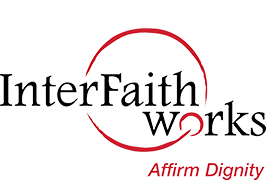History
InterFaith Works was founded in 1976 to build bridges of understanding among people of different religions and across racial divides. In the U.S. climate of concern for interracial understanding during the decades of civil rights activity, InterFaith Works aligned to fulfill this important function. The agency was also ahead of the curve on creating interreligious understanding, working first among Catholics, Protestants, and Jews, and then expanding to include Muslims, Sikh, Buddhist, Mormon, Baha’is, and other faith groups. The need for this work heightened after the 9/11 terrorist attacks, and continues to serve as a vehicle to address hate towards those who are considered “different.”
Over the years, the agency added social service programs to address the needs of people who are vulnerable, low-income, targets of oppression, and refugees who arrive through the federal refugee resettlement programs, fleeing war, political repression, and famine. Programs to address the needs of frail elderly, of those in prisons, hospitals, and nursing homes, and programs to address hunger and housing have been a part of InterFaith Works. These programs will continue to be a part of our human service work. In the coming decade, the core of the agency’s work will focus on creating dialogue on community issues and promote the racial and religious diversity of our community.
Mission Statement
InterFaith Works affirms the dignity of each person and every faith tradition, builds racial and religious equity, and creates bridges of understanding among us.
InterFaith Works’ Legacy
A Statement in Support of Settling Refugees
InterFaith Works affirms our commitment to providing a new start for refugees who have lost their homelands, communities, families, and way of life due to war, political repression, environmental devastation, and genocide. We understand and accept that settling refugees comes with organizational instability – arrivals can be interrupted by geo/political issues beyond our control, leaving the agency with the need to readjust and address uncertain or reduced funding or conversely, to dramatic increases.
But our agency was founded to leap “into the breach” of volatile, politically charged, and uncomfortable matters, as seen through our dedication to humanitarian service and our interfaith and ending racism dialogues. We accept budgetary struggles in exchange for the courage and affirmation of dignity for all that are hallmarks of our work. Our legacy lies with the people whose lives have been touched for the better.
Our Commitment to Organizational Diversity
Dedicated to racial, religious and social equity, InterFaith Works believes it is imperative that our Board of Directors, Round Table of Faith Leaders and staff reflect our core values and diversity of the people we serve. Our 30-member Board of Directors reflects our community’s diversity: Fifty-three percent are of the global majority, including African, African American, Asian, Caribbean, Latina/o and Middle Eastern. The agency’s Round Table of Faith Leaders, representing 22 different faith traditions, guides our interfaith efforts as a united voice on local, national and international faith-related issues, including recent attacks on Black men, Muslims and Jews. Our 72 staff members are as diverse as those we serve. Sixty-one percent of our staff members are of the global majority. Thirty-six staff members are former refugees or immigrants.
The Impact of InterFaith Works
InterFaith Works President/CEO Beth A. Broadway, and the Center for New Americans’ Director of Resettlement Services Marwah Alobaidi, appeared on the “Cory Cast” podcast to discuss impact – how InterFaith Works is making a tangible difference in the lives of refugees, providing essential support services like job placement, housing assistance, and cultural orientation. They explore the challenges faced by refugees as they navigate a new country and culture, and how InterFaith Works is empowering them to build a brighter future.
